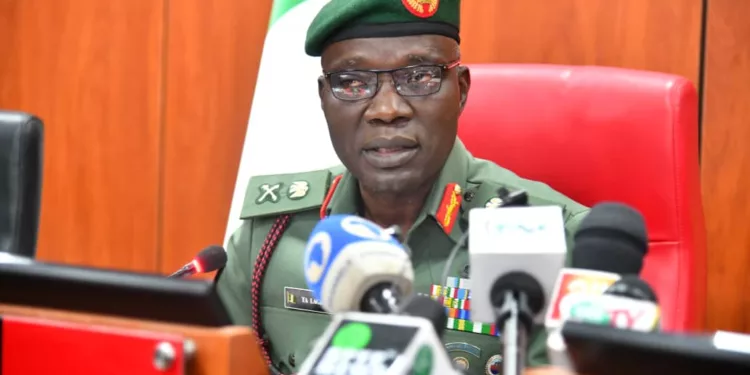Chief of Army Staff (COAS), Lieutenant General Taoreed Lagbaja has said Nigeria must make a concrete plan of solving the twin problems of poverty and unemployment to avert long-term insecurity and instability in the country.
The Army chief stated this while presenting the first strategic personality lecture at the Institute of Peace and Strategic Studies (IPSS), University of Ibadan entitled “Combating an Adversary Without Boundaries: The Need to Implement a Whole of Society Approach to Nigeria’s National Security.” He emphasized that inter-agency communication and collaboration was crucial to decimating Nigeria’s adversaries.
“Related to the factors of unemployment and poverty is demography and youth bulge with citizens of 35 years and below accounting for about 54.1 per cent of the population, estimated at 229,379,082 as of July 20, 2024. Of this figure, less than 20 per cent of them are gainfully employed,” he said.
Represented by the General Officer Commanding 2-Division of the Nigerian Army, Major General Obinna Onubogu, the Chief of Army Staff maintained that, “The twin problems of unemployment and poverty have given impetus to security challenges as the unemployed and poor are susceptible to recruitment by criminals and violent non-state actors.
“A whole-of-society approach must be implemented in Nigeria by leveraging the strength of every stakeholder to ensure a cohesive and coordinated response to threats.
“To achieve this, there must be enhanced communication, cooperation, and trust among the different sectors while also ensuring that their efforts are aligned with national interests and other security objectives.
“The strategy can potentially address the root causes of insecurity such as poverty, unemployment and social injustice often exploited by adversaries.”
According to him, the porous and unmanned borders of Nigeria have opened the country to the infiltration of adversaries from the rest of West Africa, adding that “Four West African countries ranked among the 10 most terrorised nations of the world is indicative of the transnational affiliations existing among terror groups in Sub-Saharan Africa.”
Lagbaja noted that no single agency could solve the myriads of insecurities facing the country, noting that the Nigerian Army was deepening synergy with other agencies to achieve the mandates of security of lives and property and keeping the country safe.
“The operating environment has evolved to a point where no single service or agency can effectively and independently tackle the threats to national security.
“It is therefore crucial that synergy is developed with other security agencies in the implementation of the whole of society approach to the threats.
“Communication, cooperation and collaboration among MDAs have been major topics of discussion. Although, there has been some improvement, much more still needs to be done. Counter-insurgency operations require synergy amongst agencies, who need to collaborate with each other towards achieving a common goal.”
In his welcome address, the vice chancellor of the University of Ibadan, Prof Kayode Adebowale noted that the IPSS had been at the vanguard of training security manpower and working with security sector actors towards improving the security of the country.
He expressed the confidence that the Nigerian Army would evolve effective strategies to decimate adversaries of the nation.



